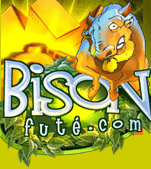 Another response to The Indian-Oz Connection:
Another response to The Indian-Oz Connection: Another response to The Indian-Oz Connection:
Another response to The Indian-Oz Connection:
A correspondent submitted the following story to suggest L. Frank Baum's appreciation of Indians:
Rob's comment
This is a story about buffaloes, not Indians. It mentions Indians only in passing and doesn't characterize them one way or another.
Here are the only references to Indians in the story:
This is a tale of the Royal Tribe of Okolom—those mighty I buffaloes that once dominated all the Western prairies, Seven hundred strong were the Okolom—great, shaggy creatures herding together and defying all enemies. Their range was well known to the Indians, to lesser herds of bisons and to all the wilds that roamed in the open; but none cared to molest or interfere with the Royal Tribe.
The legends do not say how many days and nights the great buffalo fled across the prairies with the black panther upon his shoulders. We know that the Utes saw him, and the Apaches, for their legends tell of it. Far to the south, hundreds of miles away, lived the tribe of the Comanches; and those Indians for many years told their children of Barrag the Bull, and how the Evil Genius of the Prairies, having tempted him to sin, betrayed the self-made King and abandoned him to the vengeance of the Black Panther, who was the enchanted son of the murdered King Dakt.
Let's note that Baum allegedly admired the Indians of the past, before they became "wretched" and "miserable." Since this story is set in the distant past, it would be consistent with that. It also would be consistent with Baum's scorn for Indians in 1890, when he claimed Indians had become base and degenerate and deserved to die.
Buffaloes = Indians?
If you're suggesting the buffalo tribe is a metaphor for an Indian tribe—which requires assumptions, of course—I'd say this "tribe" is stereotypical. Most of its culture consists of the brute-force battle over who gets to be king. Actually, most Indian leaders were chosen by popular opinion for their wisdom and vision. If battles to the death for the top spot occurred, I'd say they were rare.
If you're not suggesting the buffalo tribe is a metaphor for an Indian tribe, consider the possibility. Then consider what comparing a tribe of humans to a tribe of animals conveys. It conveys that humans (that is, Indians) weren't much above dumb beasts.
Do the buffalo represent a Indian tribe, or do they represent a separate, distinct ethnic culture? Either way, my conclusion is the same:
This tribe is devoid of any real culture, especially the religious rites that would accompany the selection of a "king." The story paints the buffalo as a primitive and savage people. As evidence that Baum appreciated Indians or other minorities, I'd say it fails. He appreciated them the way any "civilized" man might appreciate an exotic breed of animal.
Related links
Savage Indians
Uncivilized Indians
|
. . . |

|
All material © copyright its original owners, except where noted.
Original text and pictures © copyright 2007 by Robert Schmidt.
Copyrighted material is posted under the Fair Use provision of the Copyright Act,
which allows copying for nonprofit educational uses including criticism and commentary.
Comments sent to the publisher become the property of Blue Corn Comics
and may be used in other postings without permission.